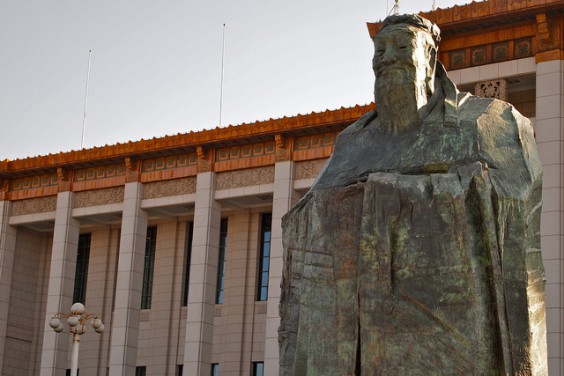Who is Afraid of Confucius?
by Tienchi Martin-Liao / October 29, 2014 / No comments
The CCP’s commodification of Confucius.

In 2011 this Confucius statue appeared, then disappeared, in Tiananmen Square. Photo via Flickr user: Remko Tanis
The Confucius Institute has never had a good reputation. Since 2004, when the first institute opened in South Korea, the organization has expanded rapidly. Today, there are 480 Confucius Institutes in ninety-one. Recently, while attending the PEN International Congress in Bishkek, Kyrgyzstan, I was surprised to find that that in that mid-sized city alone, there are two Confucius Institutes. There, young Kyrgyzstanis are enthusiastically learning Chinese, with a curriculum and facilities that are very similar to Chinese schools. When asked why they want learn Chinese, the students flashed a thumbs-up, and said “China is big, China is good.” The students knew nothing about the Umbrella Revolution in Hong Kong, which was reaching its climax at the time of my visit. Kyrgyzstan people feel very “Chinese,” not because they are neighbors, but because Big Brother provides them with all their daily necessities. Besides oil, which comes from Russia, all the merchandise on the market comes from China.

- During the Cultural Revolution, people were sentenced to death or outright murdered because of one wrong sentence. In China today writers do not lose their lives over their poems or articles; however, they are jailed for years. My friend Liu Xiaobo for example will stay in prison til 2020; even winning the Nobel Peace Prize could not help him. In prison those lucky enough not to be sentenced to hard labor play “blind chess” to kill time AND TO TRAIN THE BRAIN NOT TO RUST. Freedom of expression is still a luxury in China. The firewall is everywhere, yet words can fly above it and so can our thoughts. My column, like the blind chess played by prisoners, is an exercise to keep our brains from rusting and the situation in China from indifference.

- Tienchi Martin-Liao is the president of the Independent Chinese PEN Center. Previously she worked at the Institute for Asian Affairs in Hamburg, Germany, and lectured at the Ruhr-University Bochum from 1985 to 1991. She became head of the Richard-Wilhelm Research Center for Translation in 1991 until she took a job in 2001 as director of the Laogai Research Foundation (LRF) to work on human rights issues. She was at LRF until 2009. Martin-Liao has served as deputy director of the affiliated China Information Center and was responsible for updating the Laogai Handbook and working on the Black Series, autobiographies of Chinese political prisoners, and other human rights books. She was elected president of the Independent Chinese PEN Center in October 2009 and has daily contact with online journalists in China.
The Chinese government provides the teaching staff and materials as well as all “information about contemporary China” that is taught in the classrooms. The institutes are affiliated with “the Ministry of Education and have close ties to a number of senior Communist Party officials.” Therefore, it is no wonder that the Institutes serve as a way to export the CCP’s ideology and propaganda — packaged as factual information — worldwide.
The Institutes are not physically independent, but are almost always attached to a university. . This “graft” strategy is sophisticated, like a cell transplanted into a host. The Chinese desperately want to develop their so-called soft power and improve China’s international image. Who can refuse a friendly and profitable offer to learn a new language and culture? The guidelines are simple: the prospective host university applies to Hanban, the Confucius Institute’s superior office, to establish a CI on its campus. When it is approved, both sides share the costs: the host pays for the building, and China pays for the teaching staff and equipment. This means that the Chinese have the power to hire or fire the employees. The power dynamic is clearly defined.
Recently, the University of Chicago terminated its cooperation with Hanban. Penn State University followed, ending a five-year collaboration. Before this, universities in Canada cut off their ties with Hanban, and there have been organized oppositions to opening institutes at Australia’s University of Melbourne, Sweden’s Stockholm University, and elsewhere. All of the universities ended their relationship for the same reason: the Confucius Institute intervened with academic freedom, introducing ideology, thoughts, and information that deviated from universal values. Furthermore, the Confucius Institutes gather intelligence on the countries that host them.
Pushing the aforementioned reasons aside, how can the world take a Communist Party of China-sponsored organization with Confucius as its trademark seriously? Four decades ago, the same government and the same political party condemned the ancient philosopher as an agent of feudalism. Mao Zedong denounced Confucius as a lackey of the cruel rulers, thus a bloodsucker in a slave society, during his Anti-Lin Biao, Anti-Confucius campaign.
After half a century of political farce, after all tradition and values had been destroyed, the party heaved old Confucius onto the altar again. On January 11, 2011, a bronze Confucius figure, standing 7.9 meters tall on a pedestal, quietly appeared in front of the National Museum in Tiananmen Square. A hundred days later, the statue disappeared as quietly as it had been erected. Apparently, the CCP thinks that tradition and culture can be kicked around like a ball, and manipulated to serve its political goals.
Will the Party find success in marketing culture and human dignity like rubber boots or Christmas lights? Confucius is innocent, but the “Confucius” brand has been humiliated and degenerated; all glamor is gone. Gone, too, is the Chinese government’s trustworthiness. I will be skeptical of the CCP for as long as these party bosses fail to realize that certain things, like human dignity, do not have a price.




